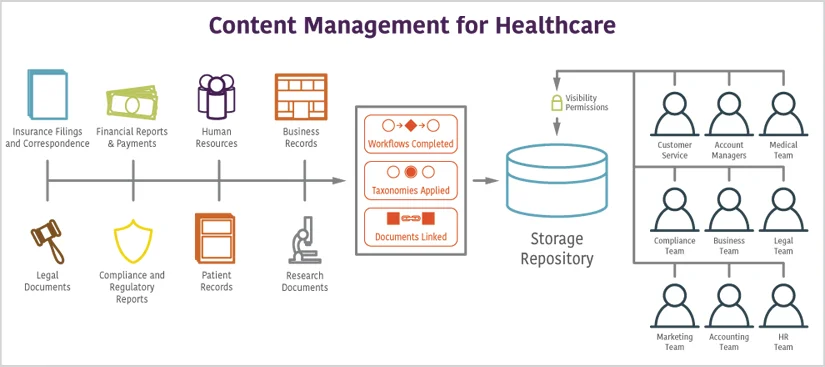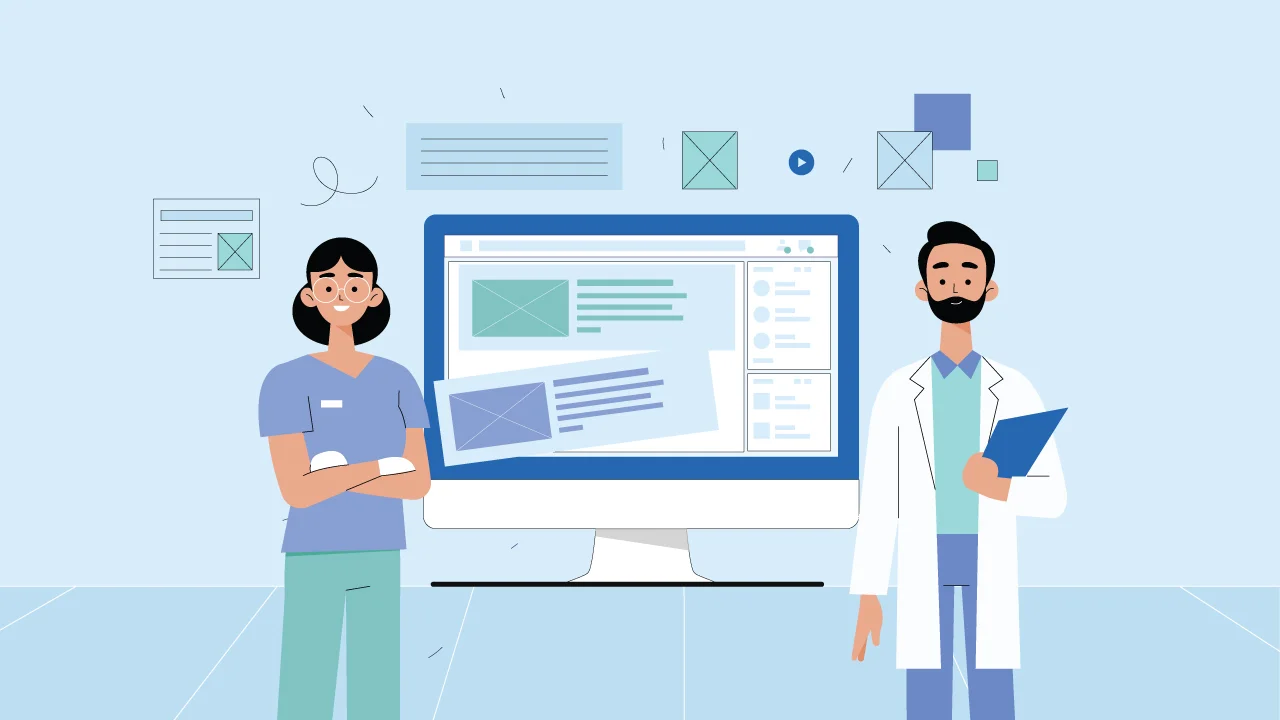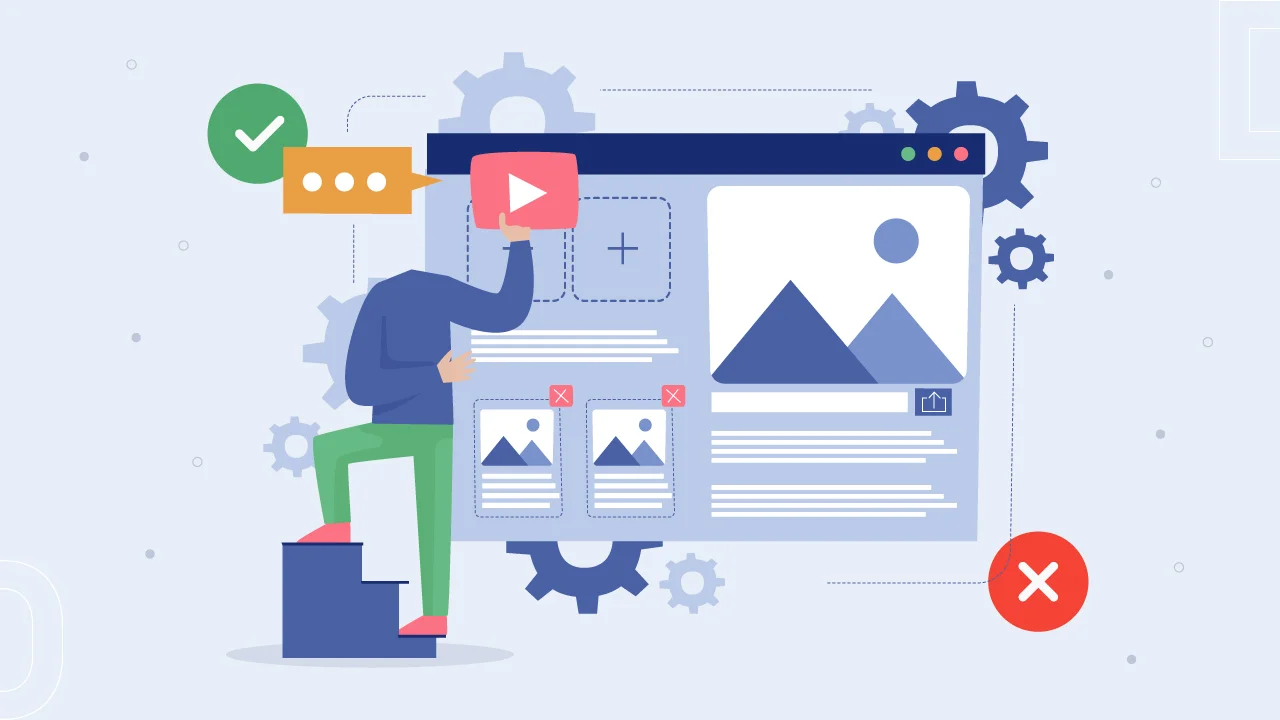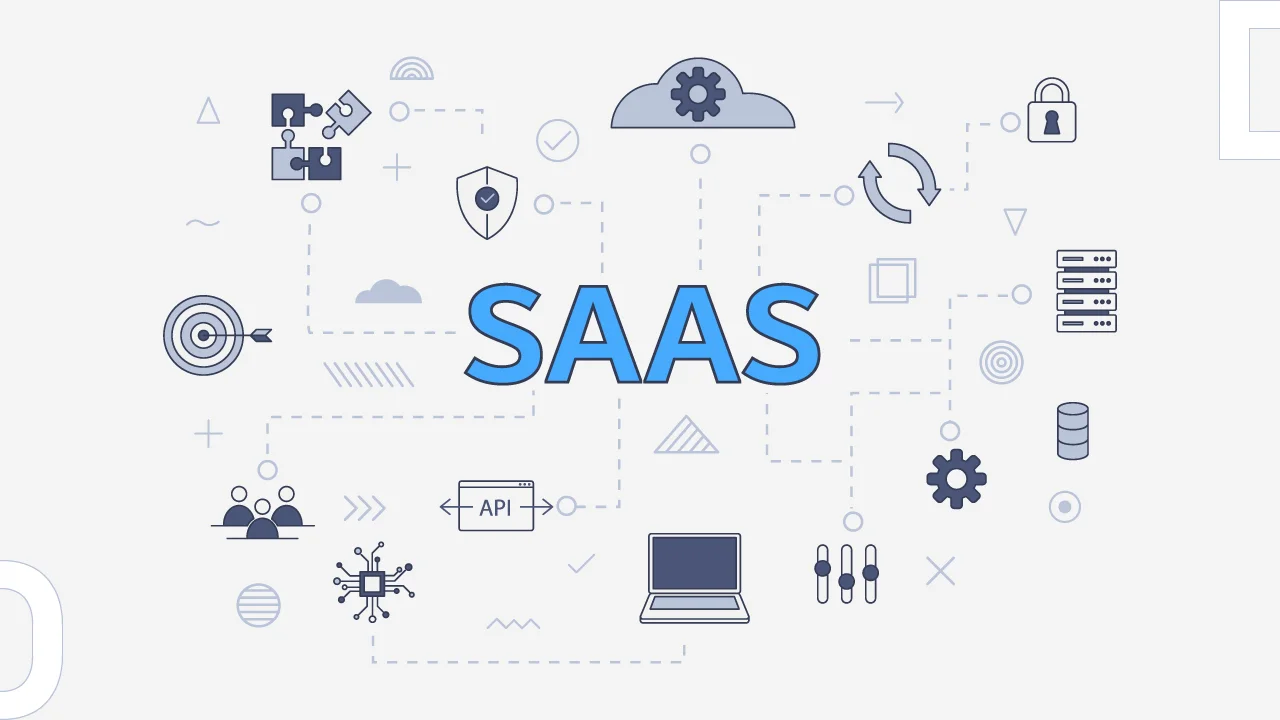Healthcare organizations are grappling with vast amounts of data and information that need to be efficiently managed, organized, and accessed.
Using a robust healthcare enterprise content management system (CMS) has emerged as a game-changer in the healthcare industry as healthcare CMS software allows for seamless workflows and data processing.
Your patients expect their healthcare provider to have a website that helps them access all information about their service provider, book appointments, give them lab results, and more.
On top of that, finding the right cms among all these options for healthcare clinics and hospitals can be overwhelming.
To help in your hunt for a great healthcare content management system, we have created a nuts and soup guide for you.
Let’s dig in.
What are healthcare content management systems?
Most content management systems do not suit the healthcare sector as the medical field is riddled with complexities and heavily regulated requirements that ask for expert solutions designed for their unique needs.
Additionally, compliance with standards such as HIPAA is a top priority in the medical field.
A CMS tailored for healthcare organizations could be the game-changer as it will allow all medical staff, nurses, doctors, and other healthcare providers to work seamlessly by giving them easy access to patient records and other medical information and, most importantly, allow them to share patient information when undertaking their duties.

This kind of collaboration is necessary to ensure that patients receive the best-coordinated solutions available.
Healthcare providers may find it easier to comply with the law when using a healthcare-specific CMS as it is already equipped with the needed privacy and security tools to help maintain patient confidentiality.
A health-specific CMS is also essential for efficiency in medical practice decision-making. Through automation and smart search options, health institutions can analyze patient health patterns and treatment outcomes, and business operations processes.
This way, healthcare providers can innovate the most capable decisions to improve patient care. Thus, choosing the right CMS platform is a vital decision that can affect an institution’s quality of service.
With a specialized solution, a healthcare provider can efficiently run their business, maintain data security, comply with laws, and provide quality patient care.
Advantages of implementing a content management system for healthcare organizations
Implementing CMS software for healthcare results in numerous benefits, drastically increasing the efficiency and quality of the medical institutions or organizations’ work.
CMS offers excellent opportunities for integration, including with RPM systems, to enhance the overall healthcare experience. By integrating an enterprise content management system in healthcare with RPM technology, healthcare organizations can create a seamless ecosystem for capturing, managing, and analyzing patient data.
By combining CMS capabilities with RPM technology, healthcare organizations can improve patient outcomes, reduce hospital readmissions, and optimize resource utilization. The list of advantages that can be drawn from such software is as follows:
- Streamlined Data Management: A healthcare CMS helps in organizing and managing large amounts of healthcare data for patients’ records, medical images, and administrative documents. The organization of data ensures that all the required information is always easily accessed, resulting in quick decision-making and, subsequently, the enhancement of patient care.
- Improved Collaboration: CMS platforms facilitate the well-coordinated work of all medical professionals by providing a platform to share, review, and update patient information. It also improves the links within the care team.
- Enhanced Patient Care: Being able to access patient health records and treatment history allows for more focused and patient-centered care. CMS is designed to help monitor the client’s progress and implement preventive treatment measures.
- Efficient Workflows: Healthcare software helps in filing away the administrative process, which allows medical staff to avoid manual work and eliminate mistakes. The tool’s optimization provides more opportunities for health workers to be with patients.
- Compliance and Security: A healthcare CMS helps to manage performance and compliance by providing necessary parameters that support HIPAA. It decreases cases of data theft and increases patient confidentiality.
- Integration with EHR and RPM: the integration of CMS into the healthcare system is vital as it accelerates the removal and replacement of large electronic health records and Remote patient monitoring systems. It also elevates the immediate care services experienced by patients and physicians.
- Scalability and Flexibility: it allows adjustment to organizations’ needs and demands of the system in the future, as well as adjustments to the future healthcare trends.
- Cost Reduction: by eliminating processes and reducing paperwork work, you eventually save a lot of money.
What are the key CMS features for healthcare?
The importance of CMS in the functioning of the healthcare system that facilitates the merging of operations and increasing patient access to quality care cannot be ignored. Specifically, a number of the following features ensure that a healthcare CMS can enable several essential advantages:
- Content Editor: A content editor should be simple and easy to use. Notably, it will help the content administrators’ efforts in creating, modifying, and administering content through which the latest information and updates are presented to the patients via the websites and patient portals.
- Workflow Capacities: These are crucial to automate various tasks associated with content management. Moreover, the functionalities will help companies develop necessary approval procedures before the content is published, ensuring that the content provided by the users is of high quality while at the same time meeting the required standards of regular and compliance bodies. Workflow automation may also include scheduling, capable of ensuring that time-oriented content such as announcements, events, or policy changes are published.
- Dynamic Content and Personalized Experiences: The CMS enables one to create dynamic and personalized content. With the current use, one can get to understand the patients he or she needs their content. In most cases, the content includes only visible parts. However, one can create a personalized experience for the patient through their background and store the content in the background.
- Flexibility and Scalability: The CMS performs various activities such as adaptability and can be supported. Moreover, the system can accommodate flexing based on the changing demand requirements.
- Security Measures: The theft of patients’ information is a punishable criminal act in the facility. Therefore, safety measures such as storage are performed all over the organization.
- Integration with EHR, ERB, and RPM: The CMS is capable of accessing EHR, ERB, and RPM wherein all facilities and some of the information are integrated.
A robust healthcare content management system facilitates seamless communication and the delivery of personalized healthcare experiences, capturing, handling, and storing both paper and electronic documents. When selecting a healthcare CMS, organizations should prioritize the above features to ensure efficient operations.
How to choose the best CMS for your healthcare organization
Finding the right content management system for healthcare can have a considerable impact on the efficiency and productivity of your organization.
There are several options available in the market; it is important to take into consideration several factors to determine the appropriate option regarding the specific healthcare context:
- Evaluation of Specific Needs and Goals of the Organization: Consider features such as the size of the healthcare organization, the number of users that will interact with the CMS, the type of content that should be managed, as well as the necessity of integration with existing systems, for example, EHR or RPM. Relying on this information, it is possible to narrow the search for a CMS that meets the unique requirements of the organization.
- Safety of Patient Data: When working with patient information, it is obligatory to comply with several healthcare regulations. That is why it is better to choose a CMS that has built-in features and measures to keep compliance with such strict rules as HIPAA.
- Privacy of Patient Information: To keep patient trust, it is important to use encryption, access controls, audit trails, and secure user authentication.
- Convenient User Interface and Editing Tool: Choosing a CMS with a user-friendly dashboard, drag-and-drop editing capability, and a WYSIWYG editor helps the client or user of any technical background use it without difficulty and the necessity of training.
In conclusion, selecting the correct content management system for healthcare means taking into account the specific needs of the client, security measures, scalability, as well as the user interface.
By choosing the right features that meet the organizational goals, the healthcare team can make an informed decision, collaborate better, and handle content management more effectively.
Top 3 open and closed-source healthcare CMS
Before we continue discussing the most popular CMS choices for healthcare-savvy organizations, it would be vital to grasp the difference between the so-called “closed-source” and “open-source” CMS.
In general, open-source CMS is better in pricing and coding as it is free for anyone to use and there is an active community constantly improving the core platform and plugins.
However, it is not safe since it keeps changing all the time. Besides, open-source options do not have a secured app layer. In contrast, closed-source CMS is safer but should obviously be acquired against the payment as it cannot be customized as much as an open-source option.
At the end of the day, this and each solution has its advantages and cons, especially depending on the organization’s target audience and objectives. For now, I suggest focusing on three worth-list-used CMS options in the healthcare industry, which are as follows:
Drupal:
Drupal is a strong and extremely customizable open-source CMS widely applied to set up a content management platform system in the healthcare field.
The platform has a strong supportive community, which offers a diversity of various modules and extensions to meet all of the needs of healthcare organizations.
Drupal integrates openly with all types of healthcare systems, empowering companies to have a customized customer experience and include complex content. This CMS also includes the compliance element of security and is scalable, which makes it a strong option for healthcare institutions that desire to create a sophisticated and functional website and patient’ knowledge base.
Sitecore:
Sitecore is a prime example of a powerful, enterprise-grade closed-source CMS that has gained significant traction within the healthcare industry. Not only is it actively developed and supported by the company, but it also offers a robust digital experience platform (DXP) that prioritizes personalization and customer engagement. One of the key advantages of Sitecore’s content management system is its ability to provide healthcare organizations with a comprehensive view of how customers interact with their services, seamlessly integrated into their overall business operations.
WordPress:
Though WordPress is not specifically designed for the healthcare sector, it has proven to be a versatile and popular choice for many organizations in this field.
Its open-source nature and extensive plugins allow healthcare providers to create engaging websites and effectively manage their digital content and patient data.
Ultimately, the decision between adopting an open-source or closed-source CMS comes down to your organization’s unique requirements, available resources, and long-term strategic goals.
Each approach has its own set of benefits and trade-offs that need to be carefully evaluated to ensure the chosen solution aligns with the organization’s objectives and delivers the desired functionality, security, and scalability.
Final thoughts
A well-implemented healthcare CMS software can empower organizations to streamline content management, enhance patient care, and ensure compliance with industry regulations.
The advantages of choosing the right CMS, including seamless collaboration, improved workflows, and enhanced patient experiences, underscore the significance of this technology in healthcare.
Our expertise in bridging the gap between CMS and RPM empowers healthcare providers to efficiently monitor patients remotely, collect vital health data, and deliver personalized care plans.



